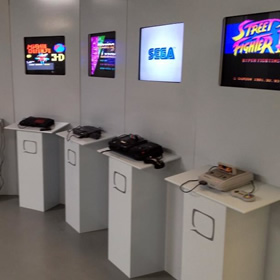Reminder to self: see if I ever can resurrect my old BBS and FidoNet node that was based on at least:
- FrontDoor (by Joaquim Homrighausen)
- RemoteAccess (by Andrew Milner)
- GoldED (by Odinn Sørensen)
- A FOSSIL driver (forgot the name)
- A Fidonet NodeList Compiler
- a Message Tosser
Maybe a good place to start: [WayBack] Running BBS Door Games on Windows 10 with GameSrv, DOSBox, plus telnet fun with WSL – Scott Hanselman
I already wrote a few times about me being on Fidonet, and BITNET in the late 1980s:
- Going to try PowerLine (next to CAT5, and having used 10Base2, 10Base-T, 100Base-TX and 1000Base-T)
- Nostalgie: KPN zet inbelplatform uit en laat Xs4all inbelverkeer afhandelen – IT Pro – Nieuws – Tweakers
- xyzzy, Relay Conferencing before IRC even existed « The Wiert Corner – irregular stream of stuff
- “You would make for a great computer programmer” « The Wiert Corner – irregular stream of stuff
- CompuServe’s forums, which still exist, are finally shutting down on 20171215
A few email addresses I have been using in that era:
- BITNET: PLUIMERS@HLERUL5
- BITNET: PCHPAPL@HLERUL52 and pchpapl@hlerul52.bitnet
- Compuserve: 100013,1443
- UUCP: jeroenp@dragons.nest.nl
- Fidonet: as point on 2:281/515.3 and as host on 2:281/521, The White House, Jeroen Pluimers
- Internet: jeroenp@rulfc1.leidenuniv.nl
A tag-line from me in that era (I blanked out the phone number as it now belongs to someone else):
o _ _ _ _ _ voice: +31-2522-XXXXX (19:00-22:00 UTC)
/ (_' | (_) (_' | | snail: P.S.O.
__/ attn. Jeroen W. Pluimers
P.O. Box 266
jeroenp@rulfc1.LeidenUniv.nl 2170 AG Sassenheim
jeroen_pluimers@f521.n281.z2.fidonet.org The Netherlands
Related:
- FidoNet – Wikipedia
- Gerard van der Land (GEcho)
- Erick van Emmerik (FileMGR)
- Arjen Lentz (Xenia)
- Ron Huiskes (RemoteAccess)
- Frans Veldman (ThunderByte Anti-Virus)
- [Archive.is] Info-IBMPC Digest V89 #31 – Google Groups
- [WayBack] 1991 section of SIMTEL20 in the info-ibmpc mailing list
- [WayBack] VIRUS-L Digest Monday, 3 Jun 1991 Volume 4 : Issue 96
- [WayBack] Ralf Brown’s Interrupt List Release 34 Last change 4/3/93
- [WayBack] Information on WinSite package gif2bmp.zip (it looks like I wrote a GIF to BMP converter <g>)
- [WayBack] Kelly Sommers on Twitter: “I ran a PCBoard BBS on my parents spare phone line at night.”
- BBS: The Documentary Archive : Free Movies : Free Download, Borrow and Streaming : Internet Archive
- [WayBack] Scott Hanselman on Twitter: “Awesome. I ran a Wildcat BBS on Desqview and a digiboard, and was a Fidonet node. Such a hopeful time. You can still run door games and BBSs today. (Go explore if you aren’t from this generation! Great historical fun.) https://t.co/WhudTNrwCG… https://t.co/tqhWtyllBj”
- [WayBack] Jeroen Pluimers on Twitter: “I paid their phone bill (for outdoing at night) and got an extra line (for incoming) to run a Dutch DFF fidonet node called The White House (now not so proud of that name any more) with frontdoor, remote access, golded, a fossil, a tosser (message processor), all on 1/…”
- [WayBack] Jeroen Pluimers on Twitter: “an pair of i286 PCs with null network, later i386 (with DESQview 386 that included QEMM 386) with Novell Netware 3.x LAN and a bunch of batch files that were multi-tasking aware so I could offload message processing to different instances/systems. Later made this work 2/…”
- [WayBack] Jeroen Pluimers on Twitter: “On Windows 3.x and Windows 95 that had slightly different command. com versions. This because I wanted to stay up to date on Turbo Pascal related stuff (which I learned slightly earlier). So I posted a lot on the groups Pascal.028, Pascal, and others. Later also hooked 3/…”
- [WayBack] Jeroen Pluimers on Twitter: “up to compuserve (where I learned to know @JohnKaster, @danny_thorpe, and many TeamB members) and laid the foundation of startingy own business in software development. Being a student, I was glad university licenses were affordable (: That era has formed me. Will never forget.”
- [WayBack] Jeroen Pluimers on Twitter: “A few more names from back then: @RolandGuijt, @joho68, @arjenlentz . I will probably remember more names later (:”
- [WayBack] Maarten van Stam on Twitter: “2:280/112 Softwareboard two lines on ISDN with USRobotics HST modems some dudes imported from the US, not easy back then … #fidonet”
- [WayBack] Danny Thorpe on Twitter: “Compuserve: 76646,1035”
- [WayBack] John Kaster on Twitter: “71510,3321” and [WayBack] FoxPro Tool Producers Directory
- [WayBack] Danny Thorpe on Twitter: “Hey! PC Magazine issues circa 1990’s are available in Google Books! Whoda thunkit? (new to me, anyway) A Blast from the Past: Cross-Platform DLLS for DOS and Windows, PC Mag Feb 22, 1994: @jpluimers @ahejlsberg @JohnKaster”
- [WayBack] John Kaster on Twitter: “I ran the fidonet relay for Clipper via PCBoard on KWIBBLE in Rosslyn, VA in the late 80s… “
- [WayBack] waldo ‘not @ any .*con’ kitty on Twitter: “Have run Waldo’s Place USA on RemoteAccess since ’89… Just started over completely with Synchronet thanks to Hurricane Florence. Now known as The SouthEast Star, a fidonet mail hub (still)…… https://t.co/1QlcFKAgvP”
- [WayBack] Kelly Sommers on Twitter: “Fidonet omg… “
- [WayBack] purana on Twitter: “Fidonet is still going alright. Pretty impressed by that. Most BBS systems running now are telnet connectable.… “
- [WayBack] Jeroen Pluimers on Twitter: “I might want to resurrect mine in the future. Where should I start getting some information on that?… “
- [WayBack] purana on Twitter: “I might setup synchronet – wiki.synchro.net as others have done. Might be a challenge since I am new to it.”
–jeroen






